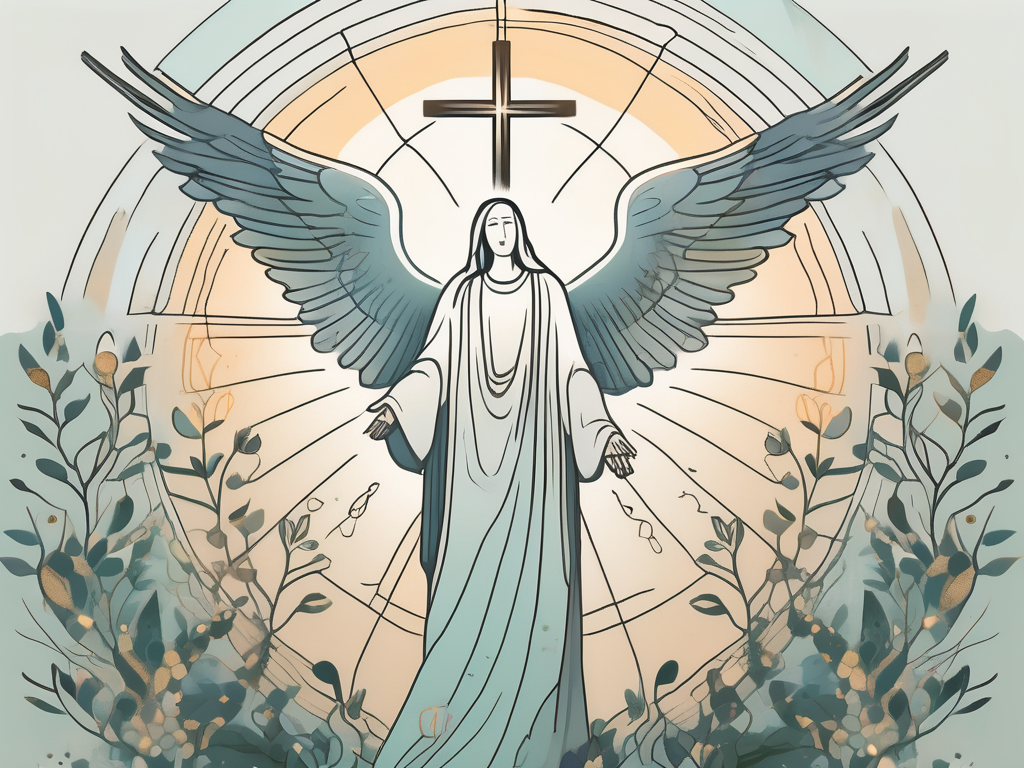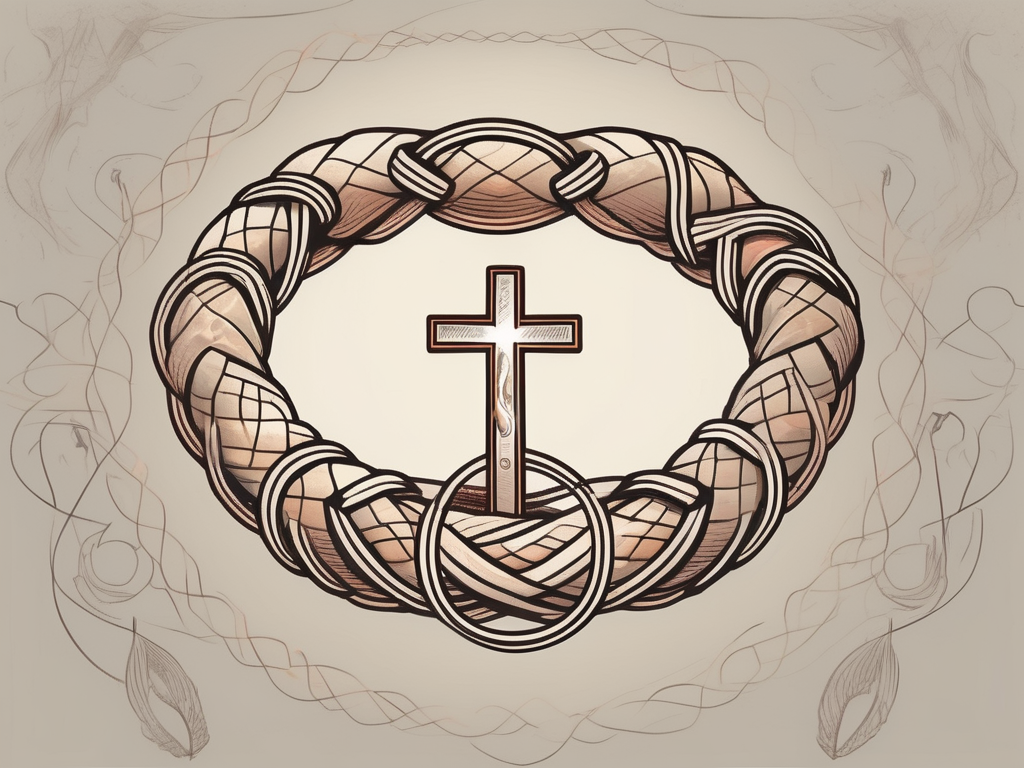Reincarnation has long been a topic of fascination and debate, but its place within Christianity remains a controversial belief. In this article, we will delve into the concept of reincarnation, explore its origins and definitions, examine its presence in different cultures and religions, and unravel the perspectives of Christianity on this mystical phenomenon. Let’s embark on this intriguing journey together.
Understanding the Concept of Reincarnation
Before we delve further into the Christian perspective on reincarnation, it’s essential to grasp the very essence of this concept. Reincarnation can be defined as the belief that after death, the soul is reborn into a new body, undergoing a cycle of births and deaths. This belief is found in various cultures throughout history and is closely tied to the idea of karma, the law of cause and effect that governs one’s actions and consequences.
But where did it all begin? Let’s take a closer look at the origins of reincarnation and its presence across different faiths and societies.
Origin and Definition of Reincarnation
The concept of reincarnation is not exclusive to any particular religion or culture. Its roots can be traced back to ancient civilizations such as ancient Egypt, India, and Greece. In these societies, the idea of the soul’s journey through multiple lives was deeply ingrained in their belief systems.
Ancient Egyptians believed in the concept of the “ka,” an eternal aspect of the soul that could be reborn into a new body. They saw death as a transition rather than an end, with the opportunity for the soul to continue its journey of growth and transformation.
In India, the belief in reincarnation is deeply intertwined with the teachings of Hinduism. The concept of samsara, the cycle of birth, death, and rebirth, is a fundamental aspect of Hindu philosophy. It is believed that the soul, or atman, is immortal and undergoes numerous lifetimes to learn and evolve spiritually.
Ancient Greeks, too, embraced the idea of reincarnation. The philosopher Pythagoras, known for his contributions to mathematics, also believed in the transmigration of souls. He believed that the soul could be reborn into different bodies, depending on the moral choices made in previous lives.
Reincarnation suggests that the soul is on a path of spiritual growth and evolution, with each life presenting new opportunities to learn and progress. It offers a perspective that extends beyond a single lifetime and invites contemplation on the greater purpose of existence.
Reincarnation in Different Cultures and Religions
As we explore reincarnation’s presence across various cultures and religions, we discover its diverse interpretations and expressions. Hinduism, Buddhism, and Jainism embrace the concept wholeheartedly, considering it a fundamental aspect of their religious teachings.
In Hinduism, the cycle of samsara is intricately linked to the concept of karma. It is believed that one’s actions in previous lives determine the circumstances and experiences of their current life. The ultimate goal is to break free from the cycle of reincarnation and attain moksha, liberation from the cycle of birth and death.
Buddhism, too, holds reincarnation as a central tenet. However, it offers a slightly different perspective. According to Buddhist teachings, the cycle of rebirth is driven by craving and attachment. The goal is to achieve enlightenment and end the cycle of suffering by attaining nirvana.
Jainism, an ancient Indian religion, also embraces the concept of reincarnation. Jains believe in the existence of countless souls, and the cycle of birth and death is seen as an opportunity to purify the soul and attain liberation from worldly attachments.
However, it’s important to note that reincarnation is not limited to Eastern religions. Indigenous tribes in different parts of the world, such as Native Americans and African communities, also hold beliefs in the cyclical nature of life and rebirth. For them, the connection to nature and the spiritual realm is deeply intertwined with the concept of reincarnation.
While reincarnation holds a significant place in these spiritual traditions, its standing within Christianity has been a subject of contention and debate. Let’s delve into the Christian perspective on reincarnation and explore the biblical references and interpretations that have shaped the faith’s position on this mystical topic.
The Christian Perspective on Reincarnation
Christianity, as one of the world’s major religions, has a distinct perspective on the concept of reincarnation. The belief in resurrection, rather than the cycle of rebirth, is central to Christian teachings. However, within the vast umbrella of Christianity, different denominations hold varying viewpoints on the matter.
Reincarnation, the belief that the soul is reborn into a new body after death, finds little direct support in the Bible. The resurrection of Jesus Christ, as depicted in the New Testament, emphasizes the belief in an afterlife marked by resurrection rather than reincarnation. The idea of resurrection is seen as a unique event, with Jesus being the first to conquer death and rise again.
However, some scholars and theologians interpret certain passages in the Bible symbolically, suggesting the possibility of reincarnation being a hidden teaching within the sacred texts. These interpretations, however, often remain on the fringes of mainstream Christian thought.
Biblical References and Interpretations
When scrutinizing the Bible, one will find limited direct references to the concept of reincarnation. The resurrection of Jesus Christ, as depicted in the New Testament, emphasizes the belief in an afterlife marked by resurrection rather than reincarnation.
However, some scholars and theologians interpret certain passages in the Bible symbolically, suggesting the possibility of reincarnation being a hidden teaching within the sacred texts. These interpretations, however, often remain on the fringes of mainstream Christian thought.
One such passage is Matthew 11:14, where Jesus refers to John the Baptist as the reincarnation of the prophet Elijah. This interpretation suggests that the soul of Elijah was reborn in John the Baptist, fulfilling the prophecy of Elijah’s return.
Another passage often cited is John 9:1-3, where Jesus encounters a man who was born blind. When asked who sinned, the man or his parents, Jesus replies, “Neither this man nor his parents sinned, but this happened so that the works of God might be displayed in him.” Some interpret this as evidence that the man’s blindness was a result of his past life’s actions, implying the possibility of reincarnation.
Views of Different Christian Denominations
As mentioned, Christian denominations hold varied stances concerning reincarnation. Orthodox Christianity unequivocally rejects the idea, asserting that each soul receives one life and is judged by God accordingly.
On the other hand, some esoteric Christian traditions, such as Gnosticism and certain branches of mysticism, entertain the idea of reincarnation. These mystical branches blend Christian teachings with elements from other belief systems, incorporating concepts of spiritual growth and rebirth.
Within the Roman Catholic Church, reincarnation is not an accepted doctrine. The Catechism of the Catholic Church explicitly states that “death is the end of human life as the time open to either accepting or rejecting the divine grace manifested in Christ.” This view aligns with the belief in resurrection rather than reincarnation.
Protestant denominations also tend to reject the idea of reincarnation, emphasizing the concept of salvation through faith in Jesus Christ. The focus is on the individual’s relationship with God and the hope of eternal life in heaven, rather than the cycle of rebirth.
Given the differing interpretations and perspectives within Christianity, it’s no wonder that the controversy surrounding reincarnation in this faith runs deep. Let’s explore some of the theological arguments against reincarnation and the potential impact it has on Christian doctrine and beliefs.
One of the main theological arguments against reincarnation is the concept of original sin. According to Christian doctrine, all humans inherit the sin of Adam and Eve, which can only be redeemed through the sacrifice of Jesus Christ. Reincarnation, with its belief in multiple lives and opportunities for spiritual growth, challenges the notion of original sin and the need for a singular act of redemption.
Another argument against reincarnation is the idea of personal responsibility and accountability. In Christian teachings, individuals are held accountable for their actions in one lifetime, with the promise of judgment and reward in the afterlife. Reincarnation, with its belief in multiple lives, raises questions about how accountability and judgment would be administered across different lifetimes.
Furthermore, the belief in resurrection holds a central place in Christian theology. The resurrection of Jesus Christ is seen as the ultimate victory over death and the promise of eternal life for believers. Reincarnation, with its emphasis on the cycle of rebirth, can be seen as undermining the significance of resurrection and the hope it offers to Christians.
Despite the controversies and differing viewpoints, the Christian perspective on reincarnation remains a topic of theological exploration and debate. As believers grapple with the complexities of faith and the mysteries of the afterlife, the question of reincarnation continues to spark curiosity and discussion within Christian communities.
The Controversy Surrounding Reincarnation in Christianity
For those who oppose the idea, there are theological arguments presented against reincarnation, rooted in the doctrine of salvation through Jesus Christ and the belief in a single earthly life followed by eternal judgment. These arguments question the compatibility of reincarnation with core Christian principles.
Furthermore, critics argue that embracing reincarnation would undermine the significance of Christ’s sacrifice and resurrection, which provide the path to salvation and eternal life for Christians.
Theological Arguments Against Reincarnation
Opponents highlight that the doctrine of reincarnation diminishes the uniqueness of Jesus Christ as the Savior, suggesting that multiple lives would render His redemptive act unnecessary. They maintain that belief in the afterlife should focus on the resurrection and ultimate union with God.
Additionally, the concept of reincarnation raises questions about how it aligns with the biblical concepts of sin, forgiveness, and divine grace. The theological implications surrounding these aspects of Christian faith remain subjects of deep theological discussion and debate.
The Impact on Christian Doctrine and Beliefs
The controversy surrounding reincarnation’s compatibility with Christianity extends beyond theology and doctrine. It also has implications for the way individuals understand and practice their faith.
If reincarnation were accepted within Christianity, it would necessitate reconsideration of traditional beliefs regarding salvation, judgment, and the purpose of human existence. Such a shift in perspective would undeniably challenge deeply ingrained traditions and reshape individuals’ understanding of their spiritual journeys.
Reincarnation and Christian Mysticism
Beyond the theological debates and controversies, there are instances in the history of Christianity where mysticism and esoteric beliefs have intersected with the concept of reincarnation.
Gnostic Christianity and Reincarnation
One notable example is found in Gnostic Christianity, an ancient mystical tradition that emerged around the first and second centuries. Some texts associated with Gnosticism discuss the idea of multiple lives and the liberation of the soul through knowledge and self-realization.
While these Gnostic texts did not become part of the biblical canon, they have influenced certain esoteric branches of Christianity and contributed to discussions on the nature of the soul’s journey.
The Influence of Eastern Religions
Additionally, the increasing awareness and exposure to Eastern religions in recent centuries have impacted the beliefs of some Christians. The teachings of Buddhism and Hinduism, with their emphasis on karma and reincarnation, have resonated with individuals seeking a broader spiritual understanding.
This blending of ideas and the integration of different belief systems highlight the evolving nature of religious beliefs and the complexity of navigating various spiritual traditions within a Christian context.
The Modern Christian’s View on Reincarnation
As times change and societies evolve, so do religious beliefs. In modern times, we witness shifting attitudes and beliefs among Christians regarding reincarnation.
Changing Attitudes and Beliefs
Many Christians today maintain a more open-minded approach towards spiritual matters, including the concept of reincarnation. This openness is fueled by a desire to explore the mysteries of life, reconcile diverse beliefs, and seek greater understanding.
While mainstream Christian denominations continue to reject the idea of reincarnation, there are individual Christians who entertain the possibility or incorporate elements of it into their personal spiritual journeys.
Reincarnation and the Afterlife Debate
The ongoing debate surrounding the nature of the afterlife intertwines with the discussion on reincarnation within Christianity. Different perspectives on the afterlife, including the possibility of annihilation, eternal damnation, or universal reconciliation, contribute to the diversity of beliefs on reincarnation.
Ultimately, the controversy surrounding reincarnation in Christianity serves as a testament to the complexity and fluidity of religious beliefs, giving individuals the freedom to explore and question their faith.
Conclusion
Reincarnation remains a controversial belief within Christianity, challenging traditional doctrines and raising questions about the nature of salvation, eternal life, and the purpose of human existence. While the concept of rebirth finds widespread acceptance in various cultures and religions, Christianity, as a whole, holds a stance primarily rooted in the belief in resurrection. Nevertheless, individual Christians’ views continue to evolve, embracing a broader spiritual understanding that incorporates elements of reincarnation. As we continue to explore the mystical and profound aspects of our existence, the controversy surrounding reincarnation in Christianity will persist, fueling ongoing discussions and reflections on the nature of faith and the mysteries of life.












